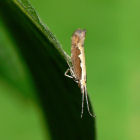. SciDev. Manuele Tamò.
The fungus Beauveria bassiana can protect cabbage against the diamondback moth
Flickr/BugMan50
Biopesticides are better and safer than chemical pesticides — policymakers must do more to promote them, says insect ecologist Manuele Tamò.
Local production. Bio-pesticides can be produced locally with cheap materials and simple equipment, and can generate additional household income by engaging
womengroups or unemployed youth.
Recent examples of the production of a baculovirus to attack the cotton bollworm in India clearly demonstrate the feasibility of this approach. Community-based production of this virus was initially funded by a grant from the UK's Department for International Development. But it has continued beyond the end of the project, prompting nongovernmental organisations (NGOs), the private sector and even the government to set up production units.
 |
Manuele Tamò is the Country
Representative IITA in Benin. |
In another example from Benin in West Africa, the international NGO SENS is encouraging community-owned enterprises to help farmers co-invest in producing biopesticides. One of these start-up enterprises, Phileol-HVC is already marketing a mixture of neem oil and essential oils branded BioPhyto. Designed for spraying horticultural crops, it costs a fraction of the price of synthetic pesticide, yet still provides the desired pest control and environmental benefits.
Scaling up. So why aren't more farmers using bio-pesticides in Africa? In West Africa, the main reason is the lack of 'off the shelf' availability. Some farmers may know the advantages of using botanical extracts, such as the absence of hazardous side-effects, but are reluctant to invest extra time and labour to produce them by themselves during the peak cropping season.
This is particularly true for male farmers. So engaging women groups or unemployed youth in producing biopesticides, as well as making them affordable and of good quality, helps promote their use. Research institutions and NGOs need to develop appropriate training materials to support the use, production, and quality control of biopesticides. Because there is no lab accreditation for quality control of biopesticides in Africa, it is currently done by producers in Africa — and they need appropriate training materials.
Similarly, vendors, consumers and policymakers need to be made aware of the higher quality and safety of products treated with bio-pesticides.











